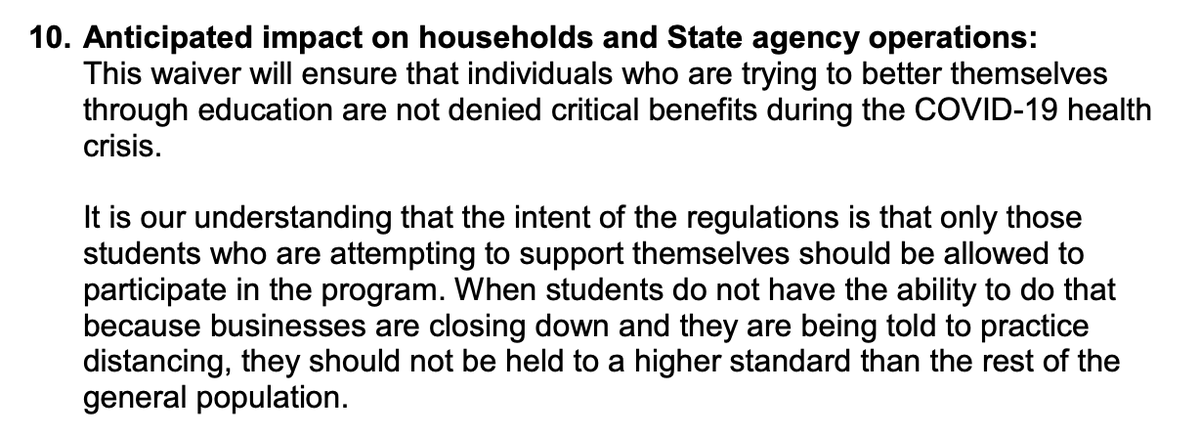Clearly FNS& #39;s decision got under my skin, because I spent hours reading the waiver requests to understand how they could deny them. States had perfectly reasonable reasons for wanting to temporarily toss out these rules (tweetstorm ahead) -- https://twitter.com/laurenwalizer/status/1249698129055752196">https://twitter.com/laurenwal...
Arizona says it plain: "The waiver will ensure that currently eligible students will maintain their SNAP benefits when they report a change due to widespread business closures."
CA: "Because a significant number of college campuses have closed in response to the outbreak of COVID-19, many students have had to leave campus housing &/or have experienced significant changes in their circumstances, such as loss of work study or other paid employment."
Delaware estimates that this waiver will allow for approximately 175 cases per month. They also noted:
Hawaii and Washington both talk about keeping higher ed partner agencies in the loop, promising to help them "provide correct information to those impacted." Love higher ed and human service partnerships!
Illinois was one of the few states that had data on student use! In their state, more than 10,000 students (10,688) are enrolled at least half-time and receive SNAP (as of Feb 2020).
Iowa& #39;s application might be my favorite. They just casually drop this bit in there, which reads like pure bureaucrat shade (and I love it) (cc: @AEDukehighered)
Massachusetts importantly notes the incredible inequities brought about by the Families First Act, which basically removes the work requirements for other SNAP recipients -- but not for students ( https://gbpi.org/2020/families-first-coronavirus-response/)">https://gbpi.org/2020/fami...
New Hampshire also had data -- they have 201 households with (currently) ineligible students. Additionally, they estimate that if the waiver had been granted, another "6,811 students would likely be eligible"
I like New Jersey& #39;s simple yet true statement that "New Jersey believes that this waiver will improve the public health response to the spread of the coronavirus." (Shouldn& #39;t we all be doing whatever we can toward those ends?)
New York gets style points for use of the underscore (the only state to do that) and raises a point we shouldn& #39;t forget: that many students are also not eligible for a stimulus payment
Had the waiver been granted, North Carolina has "approximately 5,800 ineligible students that would potentially be eligible."
Oklahoma& #39;s application contains a worthy reminder of the burden that the increased demand for public programs is placing on human services staff right now.
Several states point to similar challenges, saying that because of school and business closures, it is very difficult to verify both the student& #39;s employment/participation in a work program and their enrollment in school.
My home state of Pennsylvania says that as of Jan 2020, the state "has 45,620 individuals with a school type of graduate or undergraduate." Great!, but I& #39;m not sure what that& #39;s supposed to mean in this context (??). Maybe @PAHumanServices can help me out?
But PA does have an important reminder about SNAP eligibility for students who are still on campus: "If a student is remaining on campus and still has at least 50 percent of their meals provided for them, they will remain ineligible for SNAP benefits."
South Carolina has "approximately 1,863 ineligible students that would potentially be eligible for SNAP due to this waiver. These students have been excluded as ineligible students in active SNAP households."
South Dakota estimates that "the state could see between 100-3,000 people added to existing households or as new applicants" if the waiver were granted. They point out the demand challenges as well, and highlight that this change would produce efficiencies.
Vermont estimates that the waiver would impact about 3% of their statewide SNAP caseload.
I like West Virginia& #39;s framing: people who are following the recommendations of all their government officials shouldn& #39;t have their government deny them resources they need.
Wisconsin: Waiver approval "would allow for the administrative flexibility needed...to protect the public health & the health of our staff ... Given the current limitations, it is not realistic to continue to enforce the requirements for student exemptions for SNAP eligibility."
Wyoming may be the least populous state, but of their current SNAP caseload, more than 600 adults (638) are students whose application "met the current student requirements." /fin

 Read on Twitter
Read on Twitter









